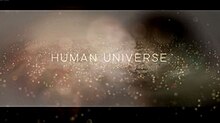Episodes
1. "Apeman – Spaceman"
First broadcast: 9:00 pm, 7 Oct 2014 on BBC Two [2]
Brian charts our story from apes to the birth of civilization and ultimately to the stars.
Beginning in Ethiopia, Professor Brian Cox discovers how the universe played a key role in our ascent from apeman to spaceman by driving the expansion of our brains. But big brains alone did not get us to space. To reveal what did, Brian heads out of Africa, to the ancient city of Petra in Jordan, where he unpicks the next part of our story – the birth of civilization – and then on to Kazakhstan, where he witnesses the return of astronauts from space and explains what took us from civilization to the stars.
2. "Why Are We Here?"
First broadcast: 9:00 pm, 14 Oct 2014 on BBC Two [2]
Brian Cox tackles the question that unites the 7 billion people on Earth: Why are we here?
Brian reveals how the wonderful complexity of nature and human life is simply the consequence of chance events constrained by the laws of physics that govern our universe. But this leads him to a deeper question – why does our universe seem to have been set up with just the right rules to create us? In a dizzying conclusion Brian unpacks this question, revealing the very latest understanding of how the universe came to be this way, and in doing so offers a radical new answer to why we are here.
3. "Are We Alone?"
First broadcast: 9:00 pm, 21 Oct 2014 on BBC Two [2]
Brian Cox explores mankind's place in the universe. He considers the possibility of alien life – could it exist and will humans ever find it?
Brian discusses the Wow! signal, Drake equation and explains the ingredients needed for an intelligent civilization to evolve in the universe – the need for a benign star, for a habitable planet, for life to spontaneously arise on such a planet and the time required for intelligent life to evolve and build a civilization. Brian weighs the evidence and arrives at his own provocative answer to the puzzle of our apparent solitude. He argues that the difficulty inherent in the development of eukaryotic cells represents such a barrier to the emergence of intelligent life that Earth may be the only planet where this has taken place in the Milky Way galaxy. In this episode Brian also tells us how Kepler observes into deep space seeking other solar systems just like our very own – How many potential 'earth-like' planets are there in the galaxy?
4. "A Place in Space and Time"
First broadcast: 9:00 pm, 28 October 2014 on BBC Two [3] [2]
Professor Brian Cox explores our origins, place and destiny in the universe. He describes the initial conditions of the human psyche as one that places itself at the center of the universe, surrounded by family, environment, and events. Brian tells the story of how our innate human curiosity has led us from feeling that we are at the center of everything, to our modern understanding of our true place in space and time – that we are living 13.8 billion years from the beginning of the universe, on a mere speck of rock in a possibly infinite expanse of space.
The story begins with Brian climbing to the summit of the fortified village of Ait-Ben-Haddou in the foothills of Morocco's Atlas Mountains. Here he demonstrates how the stars' motion across the night sky appears to make our central position self-evident.
Thanks to the artisan glass-blowers of Renaissance Venice, Galileo was able to build the first telescope and discover our orbital position around the sun—relegating us to just one among a number of planets and effecting our demotion from the center of the universe.
5. "What is Our Future?"
First broadcast: 9:00 pm, 4 Nov 2014 on BBC Two [2]
In the final episode of the series, Professor Brian Cox explores the future of our home planet, its unfolding relationship with the rest of the universe, and its effect on our destiny as a species.
This page is based on this
Wikipedia article Text is available under the
CC BY-SA 4.0 license; additional terms may apply.
Images, videos and audio are available under their respective licenses.
